Book Publications
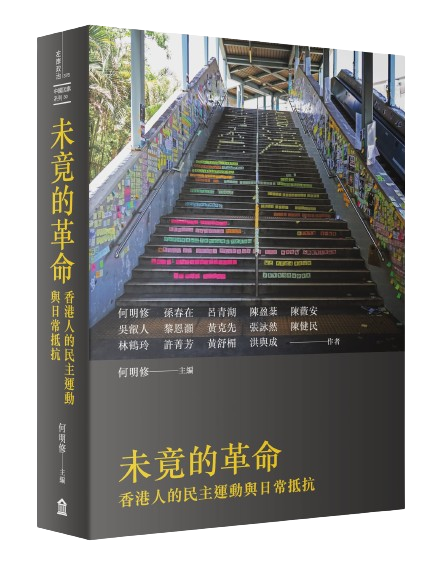
Unfinished Revolution: The Democratic Movements and Daily Resistances of Hong-Kongers
Edited by Ming-sho Ho (Rive Gauche, 2024)
From the sudden eruption of the Anti-Extradition Movement to the comprehensive suppression under the National Security Law, Hong Kong’s high degree of autonomy is no longer existent, and Taiwan also feels an urgent sense of being in a dangerous situation. The Hong Kong national security system is used to settle scores with participants and organizations of past democratic movements, in order to bring this global city under mainland control and stability. Once resistance forces are completely eliminated, rulers can execute their will.
However, even when oppressed individuals have no space to openly express dissent, they still find ways to utilize unseen corners to carry out underground and unspoken resistance. The Anti-Extradition Movement was vast in scale, with profound effects, spanning different spatial locations such as frontline/logistics, online/street, and Hong Kong/overseas. It is unprecedented in terms of duration, breadth and depth of participation, and regional and global consequences.
This book aims to document and analyze the actual experiences of various individuals amid the seismic changes in Hong Kong, including frontline protesters, lawyers, parents, Christians, overseas immigrants, and Taiwanese students remaining in Hong Kong. Their public actions may include street protests, legal assistance, and overseas lobbying. In their daily lives, they also undergo inner struggles over migration, introspective questioning of religious beliefs, and shifts in political identity. As the movement rises and falls, the protagonists of this book experience different emotional states, from passionate indignation to powerless guilt and fear of facing judicial procedures. These changes occurring simultaneously in public and private spheres deserve the attention of researchers from various disciplines.
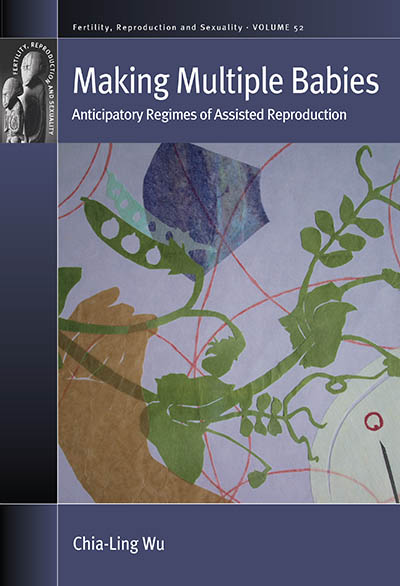
Making Multiple Babies: Anticipatory Regimes of Assisted Reproduction.
Chia-Ling Wu (Berghahn Books Press, 2023)
REVIEWS
“This book is a fascinating and insightful read … The author presents the concept of “anticipatory governance” as a means of exploring the evolving regulation of IVF. This is very useful and something I will certainly apply in my own work.” • Andrea Whittaker, Monash University
DESCRIPTION
Human beings have been producing more twins, triplets, and quadruplets than ever before, due to the expansion of medically assisted conception. This book analyzes the anticipatory regimes of making multiple babies. With archival documents, participant observation, in-depth interviews, and registry data, this book traces the global and local governance of the assisted reproductive technologies (ARTs) used to tackle multiple pregnancy since the 1970s, highlighting the early promotion of single embryo transfer in Belgium and Japan and the making of the world’s most lenient guidelines in Taiwan.
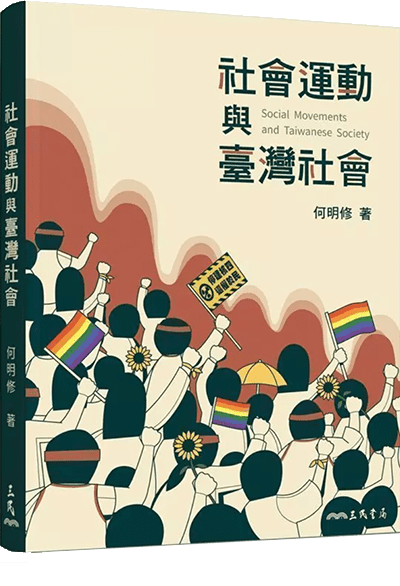
Social Movements and Taiwanese Society
Ming-sho Ho(Sanmin, 2023)
Social movements gather the strength of the masses to propel social change and pursue a vision of a better life. Once such a vision resonates with the people and ignites the will to act, it can form a social force capable of reversing unfavorable circumstances. Taiwan has bid farewell to long-term authoritarian rule and moved towards freedom and democracy, gradually realizing ideals such as labor protection, ethnic justice, gender equality, nuclear-free homeland, and marriage equality, all driven by social movements.
This book, “Social Movements and Taiwanese Society,” is extensively revised from the author’s “Introduction to Social Movements,” first published in 2005. In the seventeen years since, the landscape of social movements and related research in Taiwan and beyond has rapidly evolved, necessitating a reorganization. This book aims to provide a knowledgeable guide by reviewing existing foreign and domestic research works, assisting readers in developing the ability to analyze and understand social movement phenomena.
The new edition significantly condenses and removes outdated research literature and cases while incorporating new emerging issues such as leaderless movements, the influence of social media, conservative movements, and the economic impact of social movements, citing relevant research results from Taiwan as much as possible. With its in-depth yet accessible content and solid arguments, this book is a precise reflection of global trends and is rooted in local experiences, serving as an introductory text on social movements.

Ambience Contaminated: Sensory Experiences and the Frontier of Religion
Edited by Ke-hsien Huang, Wei-Ping Lin(National Taiwan University Press, 2022)
Now, where do we encounter the divine? The appearance of religion in modern society has always been an intriguing question. Living in the 21st century, we certainly feel that the appearance of contemporary religion seems to be increasingly complex and variable, not easily explained by traditional theories. Although there are still many devout believers, the kind of “religion” that relies on clear systems, specific rituals, and clear symbols seems to be increasingly distant from us; instead, those religious/spiritual experiences that cannot be clearly separated from everyday life seem to be closer to contemporary minds. How do we understand such changes and their implications? In this book, we introduce the concept of “atmospheric religion” to analyze the elusive characteristics of contemporary religion. Atmospheric religion is a kind of religiousness that diffuses in sensory and conscious spaces. Through the mediation of material and emotional influences, it creates atmospheres and converses with our senses, summoning our emotions and religious imaginations in fleeting moments of Aura. The five articles in this book, using Taiwan and China as examples, explore how atmospheric religion hides within the boundaries of religious and non-religious realms, connecting to broader cultural/natural experiences through our empathy. This process not only enables religion to transcend political control and bring in more participants but also weaves together multi-layered religious and spiritual experiences beyond traditional norms.

Precarious Living: Homeless People and the Helping Networks in Taiwan
Ke-hsien Huang (Spring Hill, 2021)
Finding the underlying order beneath the surface, seeing the rich yet precarious network of mutual assistance among the homeless.
Ethnography of Urban Homelessness in Taiwan
In the 1920s and 1930s, a group of sociologists from the University of Chicago, driven by a spirit of “getting their hands dirty,” engaged in participatory observation in areas of cities considered disorderly. They discovered that although old communities were gradually deteriorating, new solidarities were constantly forming. Based on different ethnicities, occupations, or subcultures, various neighborhoods developed diverse metropolitan landscapes.
This idea of “discovering the life world not known to the mainstream among the seemingly disorderly marginal groups” has persisted in the tradition of sociology. Those who were once thought to live like animals, the marginalized, actually possessed their own subcultures and social orders, with interactions demonstrating specific norms and values. Behind various “deviant” or “disorderly” behaviors, there lay shared emotions such as love, desire, dignity, spirit of mutual assistance, and will.
Informed by this disciplinary training, the author, Ke-hsien Huang, believes that beneath the isolation of the homeless exists genuine life connections; their seemingly messy sleeping places are actually spaces where this dense and lively social world operates.
This book, based on ethnography conducted in Monga Park, approaches the issue from an associative analysis perspective, presenting how the homeless utilize rich and diverse associations to meet their spiritual and material needs in work, leisure, intimate relationships, and social interactions. However, due to the high uncertainty of sleeping environments, unstable economic livelihoods, social stigma and discrimination, and lack of institutional support, these rich associations among the homeless are more fragile than those among the general population. Meanwhile, the help networks surrounding them, including religious groups, the state, and “kind-hearted individuals,” while providing material goods and services in times of emergency, also harm their dignity and distort their self-identity through interactions. Ultimately, unstable and stigmatized associations, along with impoverished material lives and feelings of despair, make the lives of the homeless even more precarious.
This book presents the life trajectories and social realities of the homeless, interwoven with the reflective thoughts of a researcher. It not only depicts the social world of the homeless but also points out the necessary reflection of those who providing assistance, while attempting to propose policy recommendations and action plans to address the homelessness issue in Taiwan.
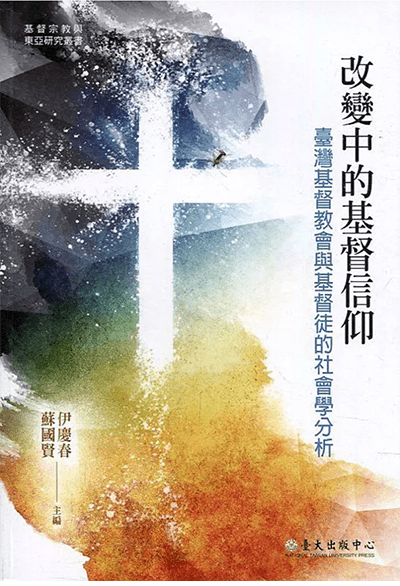
Changing Christians, Changing Churches: A Sociological Analysis of Christianity in Taiwan
Edited by Kuo-Hsien Su, Yi Chin-Chun(National Taiwan University Press, 2021)
Although Christianity is an imported religion in Taiwan, its origins and development differ significantly from Western Christianity and may not necessarily be suitable for discussion within the academic framework of Western sociology of religion. However, research in Taiwanese sociology of religion has lacked attention to indigenous history due to its long-term influence by Western theories of sociology of religion. Moreover, previous studies on indigenous religious experiences in sociology of religion have mostly focused on emerging folk Buddhism, traditional folk religions, and other indigenous religions, resulting in a relative lack of research on Christianity.
This book combines scholars from the fields of sociology, demography, economics, and religious studies to present the development of Christianity in Taiwan from three perspectives: churches, missionaries, and Christians. Utilizing denominations as an analytical framework and employing a socio-demographic perspective, the book examines the differences in beliefs, practices, and identities among different religious categories. It then connects the macro level (globalization, Taiwan’s political and economic changes, historical processes), meso level (churches, inter-church networks, theological colleges, and other organizational levels), and micro level (believers).
-1.png)
Sociology: Taiwanese Perspectives (5th edition)
Edited by Chen Chih-Jou Jay, Kuo-Ming Lin(Chuliu, 2021)
Sociology: Taiwanese Perspectives is the first basic textbook on the localization of sociology in Taiwan. The content of this book is rich and closely follows the development of Taiwanese social phenomena. Since its first edition in 1999, it has undergone four revisions and has become the main textbook for relevant courses in major universities.
The fifth edition maintains the structure of the fourth edition with 20 chapters, but nine chapters have new authors, and their content is completely different from the previous editions. These nine chapters, rewritten by new authors, include: CH.2, Culture; CH.7, Ethnic Relations; CH.9, Education; CH.10, Religion; CH.11, Healthcare; CH.12, Economy and Work; CH.13, Power and Political Systems; CH.16, Urban Development, Space, and Culture; CH.19, Globalization and Social Change. Additionally, the original authors of the other 11 chapters have made significant revisions to echo the changes and challenges in contemporary Taiwanese society and incorporate new academic research findings. Therefore, compared to the fourth edition in 2014, this edition reflects a completely new face of Taiwanese society and global situations over the past seven years.
This book continues to integrate fundamental concepts and viewpoints of Western sociology with the contents and discoveries of local studies, providing learning materials that combine abstract concepts and real-life experiences. Each chapter is accompanied by “Questions and Discussions” or “Class Activities,” as well as recommended reading lists for further exploration, which facilitate teaching and student learning.
Furthermore, the content of this book closely aligns with the experiences of Taiwanese society and can serve as supplementary teaching materials for high school Citizenship and Society courses under the 108 curriculum, or for exploration and practice in the social field, providing students with perspectives for observation and bases for thinking and argumentation.
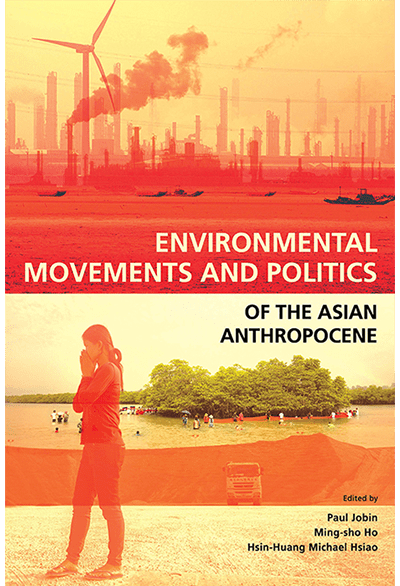
Environmental Movements and Politics of the Asian Anthropocene.
Paul Jobin, Ming-sho Ho, Hsin-Huang Michael Hsiao, editors(ISEAS – Yusof Ishak Institute press, 2021)
“This collection provides a powerful and sophisticated analysis of how environmental movements influence politics in Asia, and how politics influences movements.” — John S. Dryzek, Centenary Professor, University of Canberra
“This important book reflects the challenges and questions currently foremost in scholars’, activists’ and policy-makers’ minds―the Anthropocene, environmental justice, China’s Belt and Road Initiative, and post-politics―all addressed through the lens of environmental movements in Asia. — Jonathan Rigg, Professor at the School of Geographical Sciences, University of Bristol
“How have authoritarianism, democratization and political change affected environmentalism in East and Southeast Asia? How have environmental mobilization and demands for environmental justice at the grassroots influenced politics there? These are among the vital questions answered by this insightful and well-crafted volume.” –Paul G. Harris, Chair Professor of Global and Environmental Studies, Education University of Hong Kong
“This book shows convincingly that the concept of Anthropocene is as relevant in Asia as anywhere.” — Philip Hirsch, Emeritus Professor of Human Geography, University of Sydney
“Despite its claims to universality, the Anthropocene concept remains largely a Western phenomenon. This book is crucial in correcting this view by putting environmental movements in Asia center stage.” — Eva Horn, Professor of Literature and Cultural History, University of Vienna
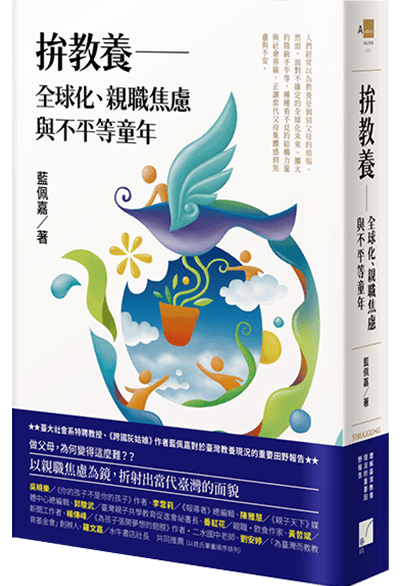
Struggling to Raise Children: Globalization, Parental Anxieties and Unequal Childhoods
Pei-Chia Lan(Spring Hill, 2019)
Why has parenting become so difficult? Through the lens of parental anxiety, it reflects the contemporary face of Taiwan. People often assume that parenting is the concern of individual parents. However, facing an uncertain globalized future, widening class inequalities, invisible structural forces and social boundaries, are collectively causing anxiety and insecurity among contemporary parents. Faced with what seems like an unsafe and uncertain future, contemporary Taiwanese parents adopt different educational and parenting strategies in an attempt to ensure the well-being of the next generation. Paradoxically, these security measures often make us feel even more insecure. Growing up in the era of “economic competition,” parents in Taiwan now focus on “parenting competition” as a key aspect of life. They aspire to break free from the shadow of corporal punishment and high-stakes exams, becoming parents vastly different from the previous generation, while also hoping that the next generation will be more capable and have more opportunities to explore the world in the era of globalization. Although this generation of parents has richer parenting resources than before, parenting itself increasingly makes them anxious, causing them to constantly question whether they are doing too little, too much, not doing it well, or doing it wrong? Through parental anxiety, we see contemporary Taiwan. This book uses parental anxiety as a mirror to reflect the risks and challenges Taiwan faces in the context of globalization, including the relatively stagnant local economy and wages, closer ties and competition with global capitalism, the uncertainty of industrial changes, and the increasingly widening class disparities shaping the unequal childhoods of many children through parenting. Pei-Chia Lan, professor of Sociology Department at National Taiwan University, continuing her observations and inquiries into social inequality in Global Cinderellas: Migrant Domestics and Newly Rich Employers in Taiwan, conducted in-depth field interviews with nearly sixty families from urban to rural areas, observed actual teaching scenes in schools, and closely examined the differences between the middle class and the working class, analyzing several major parenting models in Taiwan, questioning why parents make certain choices, and the impact of these choices on families and children, making this field report an important tool for understanding the contemporary parenting situation in Taiwan.
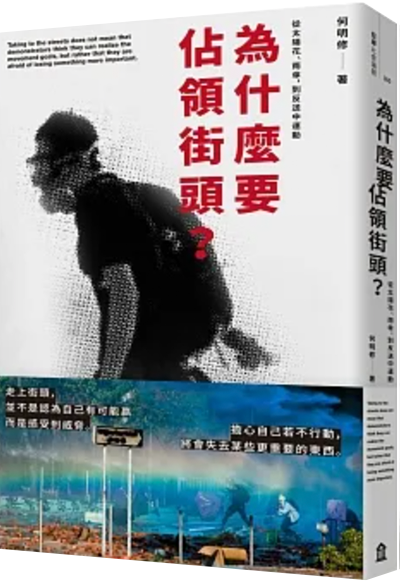
Why Do We Occupy the Streets: Sunflower, Umbrella and the Anti-Extradition Movement
Ming-sho Ho(Rive Gauche, 2019)
Sunflower movement, Umbrella movement and the Anti-Extradition Law Amendment Bill movement——these recent social movements in Taiwan and Hong Kong had their scales and consequences exceed expectations. Why did they emerge? What changes did they bring to civil societies in both places? And how did they integrate East Asia into the 21st-century wave of global resistance?
In the midst of action, we cannot predict how significantly this action will change the future.
“Occupation” became a keyword for Taiwan and Hong Kong in 2014; after that year, it also became a symbol of resistance in both places. At the beginning and end of that year, two islands with similar yet different fates experienced earth-shattering changes coincidentally.
From March 18 to April 10, 2014, Taiwan witnessed a 24-day occupation of the Legislative Yuan, with the controversy centering around the highly contentious Cross-Strait Service Trade Agreement. Due to a donation from a flower shop owner, the media dubbed this nationally and internationally watched protest as the “Sunflower Student Movement.”
Later that year, Hong Kong also witnessed a closely related protest. On September 26, student leader Joshua Wong led a crowd into the open area between the Legislative Council Building and the Chief Executive’s Office, followed by hundreds joining the “Taking back the Civil Square” movement. On the afternoon of September 28, police began firing tear gas, sparking more Hong Kong citizens to come out in support, eventually leading to the occupations of Admiralty, Causeway Bay, and Mong Kok, officially marking the beginning of the Umbrella Movement. Lasting 79 days, it was the largest protest in scale since Hong Kong’s return to Chinese sovereignty.
After these two movements, both Taiwan and Hong Kong experienced significant political and social changes, witnessing more social movements emerging and spreading to new issues. Many young people decided to engage in politics, establishing new political parties and participating in elections. In May 2016, Taiwan saw its third party alternation, with the Democratic Progressive Party winning the presidency and a majority in the Legislative Yuan for the first time. In post-Umbrella Movement Hong Kong, despite many participants being sentenced to imprisonment, calls for independence also surfaced openly for the first time.
On June 9, 2019, one million Hong Kongers took to the streets to oppose the proposed extradition bill, marking the beginning of the Anti-Extradition Law Amendment Bill Movement. Almost every week thereafter, large-scale protests took place, culminating in the District Council elections on November 24. As of then, the movement had lasted a tumultuous 168 days, far surpassing the 79 days of the Umbrella Movement five years prior. Despite the Hong Kong government officially announcing the withdrawal of the extradition bill on September 4, the people’s resistance has not ceased. The subsequent developments? Yet to be seen.
The Sunflower, Umbrella, and Anti-extradition movements belong to a rare type of social movement characterized by unexpected eruptions, large-scale and intensive participation, and profound consequences. Sociologists argue that certain unique protest events, though their success may seem uncertain at the time, upon hindsight, have the potential to completely overturn existing political landscapes and open up unprecedented possibilities for action. They refer to these as “protests that flip history.”
These three movements in Taiwan and Hong Kong have their own unique contexts. Chinese culture has traditionally been obedient to political authority, so why did such highly disruptive mass protests occur? The success rate of these protests was almost zero, so why did participants in both places engage in seemingly doomed actions? Civil society organizations and political figures were marginalized in these protests, with the leaders of the Sunflower and Umbrella movements even being students. How do we explain these unconventional movement leaders? How did such large-scale collective actions arise and sustain themselves over time?
This book combines fieldwork and theory. On one hand, through over a hundred interviews, it attempts to depict the words and actions of movement participants, giving a more vivid picture of these recent protest movements that have had a huge impact on Taiwan and Hong Kong. On the other hand, it seeks to explain, from the perspective of social movement researchers, the origins, processes, and consequences of the historical upheaval brought about by several protests in Taiwan and Hong Kong.
Taking to the streets does not mean that the demonstrators think they can realize the movement goals, but rather that they are afraid of losing something more important.
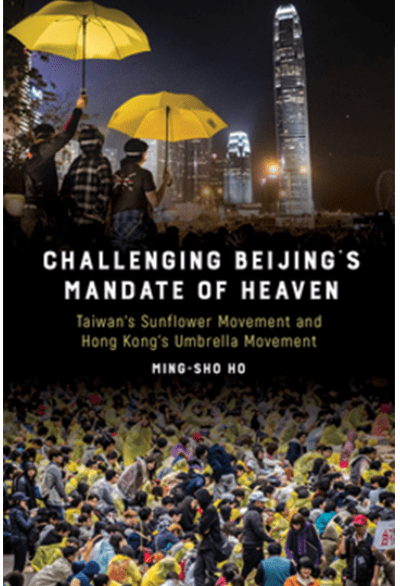
Challenging Beijing’s Mandate of Heaven .
Ming-sho Ho (Philadelphia: Temple University Press, 2019)
In 2014, the Sunflower Movement in Taiwan grabbed international attention as citizen protesters demanded the Taiwan government withdraw its free-trade agreement with China. In that same year, in Hong Kong, the Umbrella Movement sustained 79 days of demonstrations, protests that demanded genuine universal suffrage in electing Hong Kong’s chief executive. It too, became an international incident before it collapsed. Both of these student-led movements featured large-scale and intense participation and had deep and far-reaching consequences. But how did two massive and disruptive protests take place in culturally conservative societies? And how did the two “occupy”-style protests against Chinese influences on local politics arrive at such strikingly divergent results?
Challenging Beijing’s Mandate of Heaven aims to make sense of the origins, processes, and outcomes of these eventful protests in Taiwan and Hong Kong. Ming-sho Ho compares the dynamics of the two movements, from the existing networks of activists that preceded protest, to the perceived threats that ignited the movements, to the government strategies with which they contended, and to the nature of their coordination. Moreover, he contextualizes these protests in a period of global prominence for student, occupy, and anti-globalization protests and situates them within social movement studies.
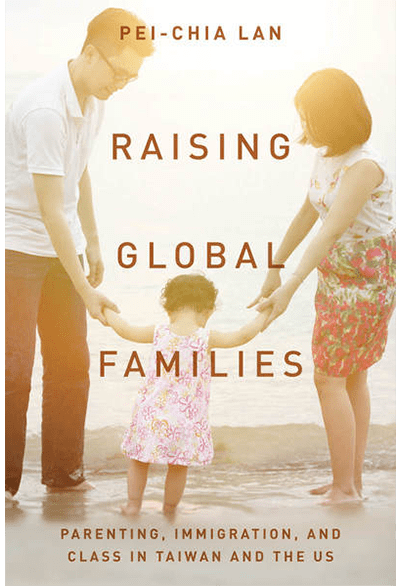
Raising Global Families: Parenting, Immigration, and Class in Taiwan and the US.
Pei-Chia Lan (Stanford University Press, 2018)
Public discourse on Asian parenting tends to fixate on ethnic culture as a static value set, disguising the fluidity and diversity of Chinese parenting. Such stereotypes also fail to account for the challenges of raising children in a rapidly modernizing world, full of globalizing values. In Raising Global Families, Pei-Chia Lan examines how ethnic Chinese parents in Taiwan and the United States negotiate cultural differences and class inequality to raise children in the contexts of globalization and immigration. She draws on a uniquely comparative, multisited research model with four groups of parents: middle-class and working-class parents in Taiwan, and middle-class and working-class Chinese immigrants in the Boston area. Despite sharing a similar ethnic cultural background, these parents develop class-specific, context-sensitive strategies for arranging their children’s education, care, and discipline, and for coping with uncertainties provoked by their changing surroundings. Lan’s cross-Pacific comparison demonstrates that class inequality permeates the fabric of family life, even as it takes shape in different ways across national contexts.
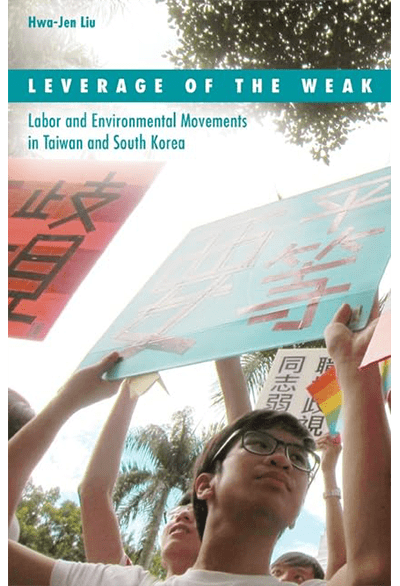
Leverage of the Weak: Labor and Environmental Movements in Taiwan and South Korea.
Hwa-Jen Liu( University of Minnesota Press, 2015)
DESCRIPTION
Comparing Taiwan and South Korea strategically, Hwa-Jen Liu seeks an answer to a deceptively simple question: Why do social movements appear at different times in a nation’s development?
Despite their apparent resemblance-a colonial heritage, authoritarian rule, rapid industrialization, and structural similarities-Taiwan and South Korea were opposites in their experiences with two key social movements. South Korea followed a conventional capitalist route: labor movements challenged the system long before environmental movements did. In Taiwan, pro-environment struggles gained strength before labor activism. Liu argues that part of the explanation lies in an analysis of how movements advance their causes by utilizing different types of power. Whereas labor movements have the power of economic leverage, environmental movements depend on the power of ideology. Therefore, examining material factors versus ideational factors is crucial to understanding the successes (or failures) of social movements.
Leverage of the Weakis a significant contribution to the literature on social movements, to the study of East Asian political economies, and to the progress of the comparative-historical method. It enhances knowledge of movement emergence, investigates the possibilities and obstacles involved in forging labor-environment alliances, and offers the first systematic, multilayered comparisons across movements and nations in East Asia.
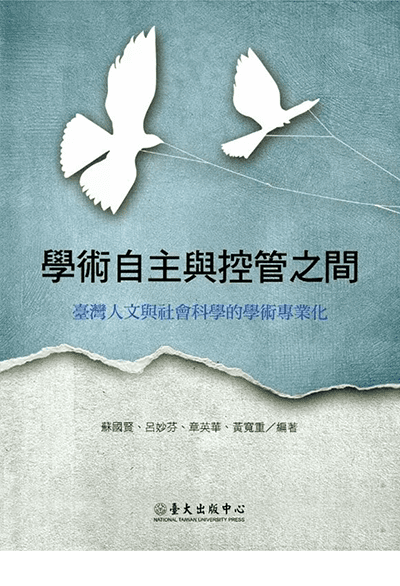
Autonomy and Accountability: Academic Professionalism and Evaluation in Humanities and Social Sciences in Taiwan
Edited by Kuo-Hsien Su, Lu Miaw-fen, Chang Ying-Hwa, Kuan-chung Huang(National Taiwan University Press, 2014)
Has the academic evaluation system promoted the positive development of academic research? Or has it merely led humanities and social science researchers to become sacrificial lambs under the institutional yoke of academia? This book conducts in-depth research and reflection on the current academic evaluation system in Taiwan through surveys, interviews, and seminars. Humanities and social sciences differ fundamentally from natural sciences, and their disparities are reflected not only in academic performance but also in evaluation methods. In recent years, Taiwan’s academic community has been dominated by the natural sciences, with goals of internationalization, striving for excellence, and pursuit of top-tier status, resulting in a homogenized and data-driven evaluation approach. This has led to the constriction of disciplines like humanities, social sciences, and arts, which differ from natural sciences, and has caused the decline of public intellectuals in Taiwan. When public intellectuals can no longer provide guidance on public affairs, Taiwan consequently loses its international standing. To grasp and guide the academic development in humanities and social sciences, the 8th National Science and Technology Conference approved the “Research Project on Establishing an Evaluation Mechanism Suitable for the Academic Development of Humanities and Social Sciences.” The project team completed online questionnaire surveys and analyses, publisher interviews, two seminars for arts disciplines, three advisory committee meetings within two years, and held three seminars to present the project’s results in the northern, central, and southern regions of Taiwan, receiving enthusiastic responses. This book presents the project’s findings, not only focusing on domestic academic evaluation research but also collecting and analyzing some evaluation methods from foreign academia, providing a basis for comparison and serving as a reference for adjusting the system.
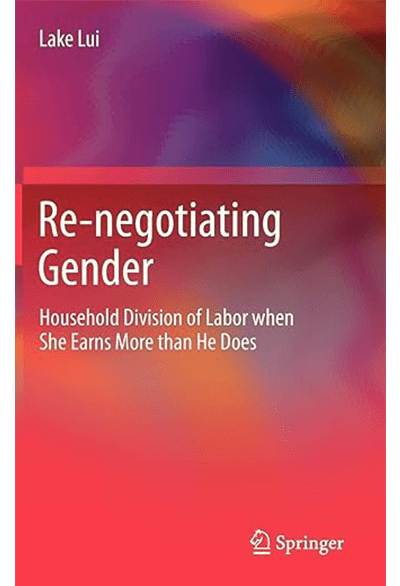
Re-negotiating Gender: Household Division of Labor when She Earns More than He Does.
Lake Lui (Springer Press, 2012)
Introduction:
In Chinese societies where both “money” and “gender” confer power, can a woman’s economic success relative to her husband’s bring about a more equal division of household labor? Lui’s qualitative study of “status-reversed” Hong Kong families, wherein wives earn more than their husbands, examines how couples re-negotiate household labor in ways that perpetuate male dominance within the family even when the traditional gender expectation that “men rule outside, women rule inside” (nanzhuwai, nuzhunei) is challenged. Going beyond the dyadic negotiation of household labor, this important study also explores the role of “third parties,” namely the couples’ children and parents, who actively encourage couples to conform to traditional gender norms, thereby reproducing an unequal division of household labor. Based upon the experiences of families with stay-at-home dads, Lui further identifies a new mechanism of deconstructing gender, by which couples concertedly construct new norms of “work” and “gender” that they maintain through daily interactions to fit their atypical relative earnings. As a result, there are sparks of hope that both men and women can be liberated from a set of traditional social norms. Re-negotiating Gender: Household Division of Labor When She Earns More than He Does is essential reading in the fields of family and gender studies, sociology, psychology, and East Asian studies.
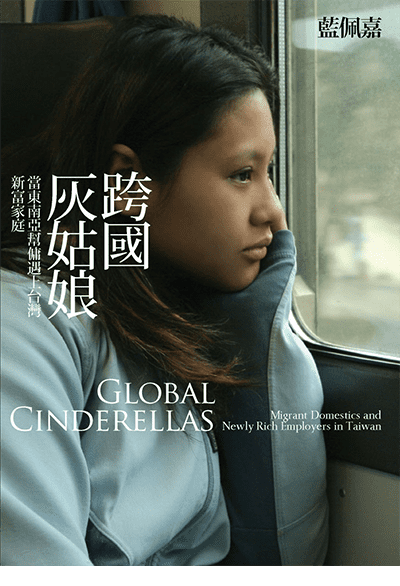
Global Cinderellas: Migrant Domestics and Newly Rich Employers in Taiwan
Pei-Chia Lan(Flâneur Culture Lab, 2008)
The book you’re looking at is not only the best reportage work in recent years Taiwan, but also a seminal academic work discussing the situation of foreign domestic workers in Taiwan. It has received numerous important international academic honors awarded to Taiwanese for the first time and has been recognized by domestic institutions such as Academia Sinica and the National Science Council. It’s called an academic paper because of its rigorous approach, yet it’s not just an academic paper—it’s genuinely as captivating as a novel. When you open it, the stories hidden behind Taiwan’s everyday life unfold before your eyes like a movie. This book tells the stories of female foreign domestic workers coming to Taiwan. Since 1992, batches of domestic workers have bravely crossed the seas to arrive at this completely unfamiliar island. Just counting registered domestic workers, there are already over 160,000. They come as short-term contract workers, silently working in the corners of Taiwanese society, sustaining Taiwan’s “modern life.” However, employers often treat them as disposable labor, denying their citizenship rights and even basic human rights. In the eyes of these domestic workers who come to Taiwan alone, familiar scenes and images transform into a different reality: for Vanessa, who has just arrived in Taiwan, the Taoyuan International Airport is a starting point into the unknown, and the trees along the highways hide unimaginable fears. For Tiwi, Qoo juice is not only the favorite drink of the Taiwanese children she cares for but also a tool for expressing maternal love to her daughter abroad. Under every family’s roof lies an untold story, connecting Taiwan’s nouveau riche employers with domestic workers from Southeast Asia. From Manila to Taiwan, passing through Taipei Main Station, Zhongshan North Road, all the way to the kitchens and bedrooms of homes, Associate Professor Pei-Chia Lan from National Taiwan University’s Department of Sociology interviewed 58 Filipino and 35 Indonesian female domestic workers, providing us with a profound understanding of their destinies and thoughts. This is the first comprehensive report on the lives of foreign domestic workers. The author also interviewed 51 employers who hire foreign domestic workers, allowing us to reflect on how fragile our own family’s parent-child and marital relationships are. Originally published in English by the prestigious Duke University Press in 2006, winning awards such as the American Sociological Association’s Gender Studies Book of the Year and the International Convention of Asia Scholars’ Best Book in Social Sciences, after three years, Pei-Chia Lan rewrote Global Cinderellas in her native language with a straightforward and easy-to-understand style and a wealth of real stories, presenting it to Taiwanese readers. As the author herself says, this book hopes to not only convince readers through theoretical language but also move them by presenting the life stories of different people.
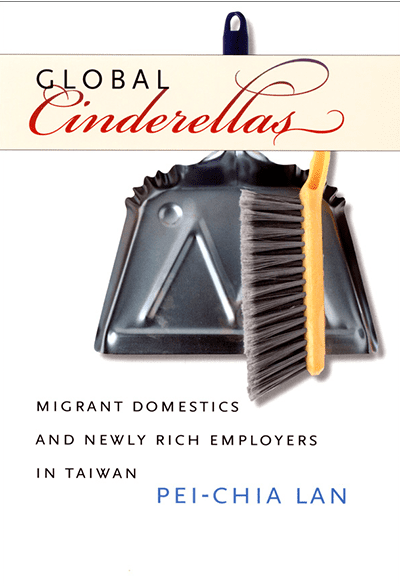
Global Cinderellas: Migrant Domestics and Newly Rich Employers in Taiwan.
Pei-Chia Lan (Duke University Press, 2006)
Migrant women are the primary source of paid domestic labor around the world. Since the 1980s, the newly prosperous countries of East Asia have recruited foreign household workers at a rapidly increasing rate. Many come from the Philippines and Indonesia. Pei-Chia Lan interviewed and spent time with dozens of Filipina and Indonesian domestics working in and around Taipei as well as many of their Taiwanese employers. On the basis of the vivid ethnographic detail she collected, Lan provides a nuanced look at how boundaries between worker and employer are maintained and negotiated in private households. She also sheds light on the fate of the workers, “global Cinderellas” who seek an escape from poverty at home only to find themselves treated as disposable labor abroad.
Lan demonstrates how economic disparities, immigration policies, race, ethnicity, and gender intersect in the relationship between the migrant workers and their Taiwanese employers. The employers are eager to flex their recently acquired financial muscle; many are first-generation career women as well as first-generation employers. The domestics are recruited from abroad as contract and “guest” workers; restrictive immigration policies prohibit them from seeking permanent residence or transferring from one employer to another. They care for Taiwanese families’ children, often having left their own behind. Throughout Global Cinderellas, Lan pays particular attention to how the women she studied identify themselves in relation to “others”—whether they be of different classes, nationalities, ethnicities, or education levels. In so doing, she offers a framework for thinking about how migrant workers and their employers understand themselves in the midst of dynamic transnational labor flows.